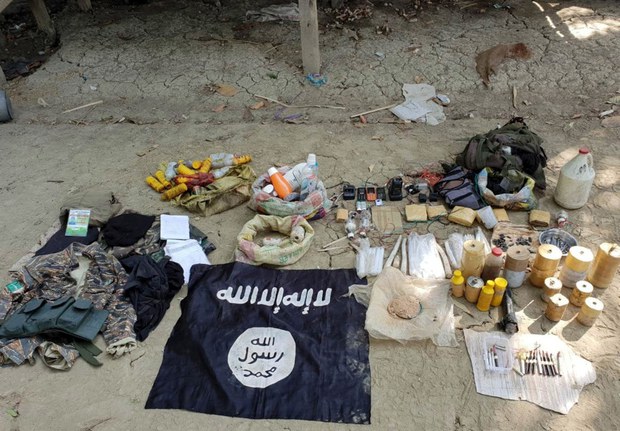Foreigner Among Suspected Militants Killed in Fighting in Philippine South
2019.03.13
Cotabato, Philippines
 Homemade bombs, an Islamic State flag, fatigue uniforms and others items that were recovered after an encounter with suspected militants in Shariff Saydona Mustapha, a town in Maguindanao province in the southern Philippines, are shown in a handout photo, March 13, 2019.
Homemade bombs, an Islamic State flag, fatigue uniforms and others items that were recovered after an encounter with suspected militants in Shariff Saydona Mustapha, a town in Maguindanao province in the southern Philippines, are shown in a handout photo, March 13, 2019.
Updated at 12:21 p.m. ET on 2019-03-14
At least one suspect killed in three days of fighting between militants and government forces in the southern Philippines was a foreigner, military officials said Wednesday in updating the toll on the enemy side to a minimum of 22 dead.
Officials displayed a photo to reporters of one of the slain suspected militants. It showed a man who, they said, appeared to be of non-Filipino origin.
The slain fighter “is a foreigner believed to be an Arab,” said Capt. Arvin Encinas, a local army spokesman.
“The neutralization of the foreign national significantly reduces the capability of the terror group on training and [the] manufacturing of anti-personnel mines,” Encinas said.
The military said it fired howitzer rockets toward a marshy areas of Shariff Saydona Mustapha, a town in Maguindanao province where local Islamic State (IS) operative Abu Turaife and his group were believed to be hiding.
Turaife is a senior leader of the Bangsamoro Islamic Freedom Fighters (BIFF), whose faction has pledged allegiance to IS.
Several of the slain BIFF fighters recovered were “foreign looking,” and local officials and government militiamen were helping to identify the cadavers, Lt. Col. Rogelio Gabi, commander of the Philippine Army’s 40th Infantry Battalion, told BenarNews.
“We have overrun their encampment. Our operation is aimed to get Turaife dead or alive,” Gabi said.
Last year, the military had estimated that at least 40 foreign fighters were still believed to be fighting in Mindanao, many of whom had slipped into the south across its porous borders with neighboring Malaysia and Indonesia, according to officials.
Several foreigners were also caught last year in the south, including a Spanish national of Arabic-descent who was travelling with a militant from the Abu Sayyaf, the country’s smallest, but fiercest militant group that has been blamed for some of the worst terrorist attacks in the Philippines.
![190313-PH-buffalo-inside-620.jpg A plume of smoke is seen in the wake of a military artillery assault against suspected pro-Islamic State militants in Shariff Saydona Mustapha town in Maguindanao province, March 13, 2019. [HO/Philippine Army]](/english/news/philippine/Maguindanao-fighting-03132019131244.html/190313-PH-buffalo-inside-620.jpg/@@images/87264b31-a2eb-4989-9983-a5970d672622.jpeg)
Hostilities began on Monday, and initial reports from the field indicated that eight enemy fighters and a soldier had been killed. The death toll on the enemy side had risen to 22, as of Wednesday, around Maguindanao, the military said. Elsewhere in the south, near the ruined city of Marawi, clashes between troops and militants left two soldiers dead on Tuesday.
BIFF broke away in 2008 from the larger Moro Islamic Liberation Front (MILF), the main separatist rebel group, when the latter decided to engage Manila in peace talks and dropped its fight for total independence in the southern Mindanao region.
MILF eventually signed a peace deal with the government five years ago, leading to the creation of a Muslim autonomous region that the group now leads.
Turaife subsequently pledged allegiance to IS, providing tactical support to comrades who took over Marawi city during a five-month siege in 2017. The overall leader of the IS then, Isnilon Hapilon, was killed in an ensuing battle with government forces, and Turaife was said to be one of several militants in a position to take his place.
Elsewhere in Mindanao, near Marawi, local army commander Col. Romeo Brawner, said that pursuit operations were ongoing against another group of militants led by Humam Abdul Najib, who is also known as Abu Dar.
Military intelligence has indicated that Dar was a cousin of the Maute brothers, who helped Hapilon mount the Marawi siege. The Mautes were killed along with Hapilon five months after the siege began.
In Internet chatter monitored by the military, the IS “East Asia Wilayah” acknowledged the fighting near the village of Pagayawan outside Marawi, but claimed that it had killed 10 soldiers.
Brawner, however, confirmed that there were fatalities on the military side, but said only two were soldiers were slain. He dismissed the IS claim as propaganda.
Richel V. Umel and Joseph Jubelag contributed from Iligan City and General Santos City, Philippines.
CORRECTION: An earlier version wrongly reported that military officials updated the death toll on the militant side on Tuesday.







